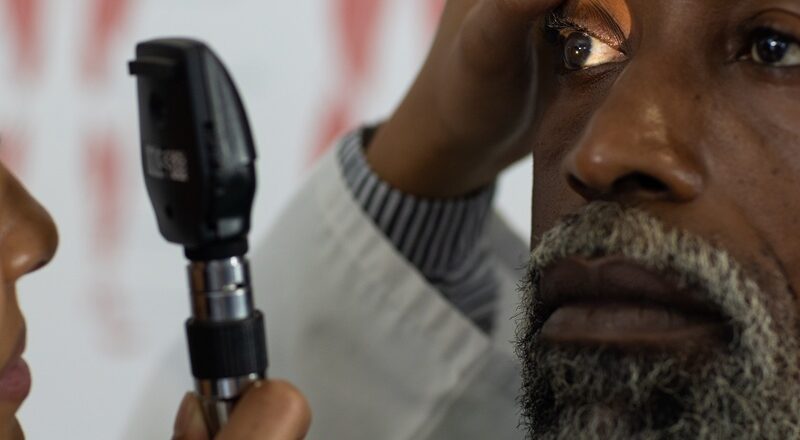Diabetic Eye Disease doesn’t just affect blood sugar levels — it can also have a profound impact on your vision. If you or someone you love is living with diabetes, it’s essential to understand how it can affect eye health, what symptoms to watch for, how often to get eye exams, and ways to protect your eyesight. In this blog, we’ll break it all down in a clear, easy-to-follow way.
What Is Diabetic Eye Disease?
Diabetic eye disease includes a group of vision-related issues that can affect people living with diabetes. These complications arise as persistently high blood sugar levels gradually damage the delicate blood vessels in the eyes. The most common conditions include:
- Diabetic Retinopathy arises when the blood vessels in the retina (the light-sensitive part at the back of your eye) become damaged and leak blood or fluid. It is a major contributor to vision impairment in adults.
- Diabetic Macular Edema (DME): Diabetic retinopathy can lead to a complication in which fluid accumulates in the macula, the central region of the retina, which is crucial for sharp vision.
- Cataracts: People with diabetes are more inclined to develop cataracts earlier and more quickly than those without the condition.
- Glaucoma: Individuals with diabetes have double the risk of developing glaucoma, a condition characterized by high eye pressure that harms the optic nerve.
How Does Diabetes Affect Vision?
Persistently elevated blood sugar levels may harm the blood vessels in the eye. This damage can lead to leaking, swelling, or blocked blood vessels, affecting how well you see.
Diabetes can cause alterations in the shape and flexibility of the eye’s lens, which may result in blurred or fluctuating vision. In some cases, high sugar levels can cause the lens to swell, temporarily changing your prescription.
Without proper attention, these consequences may result in temporary or permanent vision impairment.
What Are the Symptoms of Diabetic Eye Problems?
At the start, diabetic eye disease may not show any apparent symptoms, which is why regular eye exams are so important. Still, some signs may develop as the condition progresses. Keep an eye out for:
- Blurry or distorted vision
- Unexpected shifts in your vision clarity
- Floaters (tiny dark shapes drifting in your field of vision)
- Flashes of light
- Poor night vision
- Fading or dull colours
- Loss of peripheral (side) vision
- A sudden, severe loss of sight
If you experience any of these symptoms, please be sure to consult an eye care specialist right away.
When Should People with Diabetes Have an Eye Exam?
The timing of eye exams depends on the type of diabetes you have:
- For Type 1 Diabetes: Schedule your first comprehensive eye exam within five years of your diagnosis, then continue with yearly exams.
- For Type 2 Diabetes: Have a comprehensive eye exam right after being diagnosed, followed by annual exams.
- For Pregnant Women with Diabetes: It’s recommended to have an eye exam before getting pregnant or in the first trimester, and then follow your doctor’s advice on how often to return.
Regular eye exams are critical for catching problems early and preventing vision loss.
How to Protect Your Vision If You Have Diabetes?
The good news is that many diabetic eye problems can be prevented or slowed down with the proper care. Here’s what you can do:
- Control your blood sugar levels as consistently as possible. High spikes can damage your eyes.
- Manage your blood pressure and cholesterol. Keeping these numbers healthy lowers the risk of eye complications.
- Book regular, dilated eye exams. These specialized exams allow your optometrist to check the back of your eyes for any signs of damage.
- Stay active and eat a healthy diet. Exercise helps regulate blood sugar, improves circulation, and benefits your overall health.
- Stop smoking. Smoking increases your risk of diabetic complications, including vision problems.
- Use protective eyewear when needed, especially for work or sports.
Why Regular Eye Exams Matter for People with Diabetes?
Even if you aren’t noticing any problems with your vision, yearly eye exams are one of the best tools for protecting your sight. Many diabetic eye issues can go unnoticed in the early stages. Comprehensive eye exams, including dilated retinal exams, can detect signs of disease before symptoms start.
At Markham Vision Centre, our licensed opticians and experienced eye care team use advanced equipment to spot these early warning signs and help you maintain good vision health.
Final Thought:
If you or a loved one has diabetes, don’t wait for symptoms to appear. Schedule an eye exam with Markham Vision Centre today, and let our trusted, experienced team help you protect your sight for years to come.
FAQ:
Q: Can diabetes cause sudden vision loss?
Yes — if diabetic retinopathy or other complications go untreated, sudden vision loss can happen.
Q: Is blurry vision always a sign of diabetic eye disease?
Not always. It could be caused by changes in blood sugar or other eye problems, but it’s worth getting checked if you notice it.


